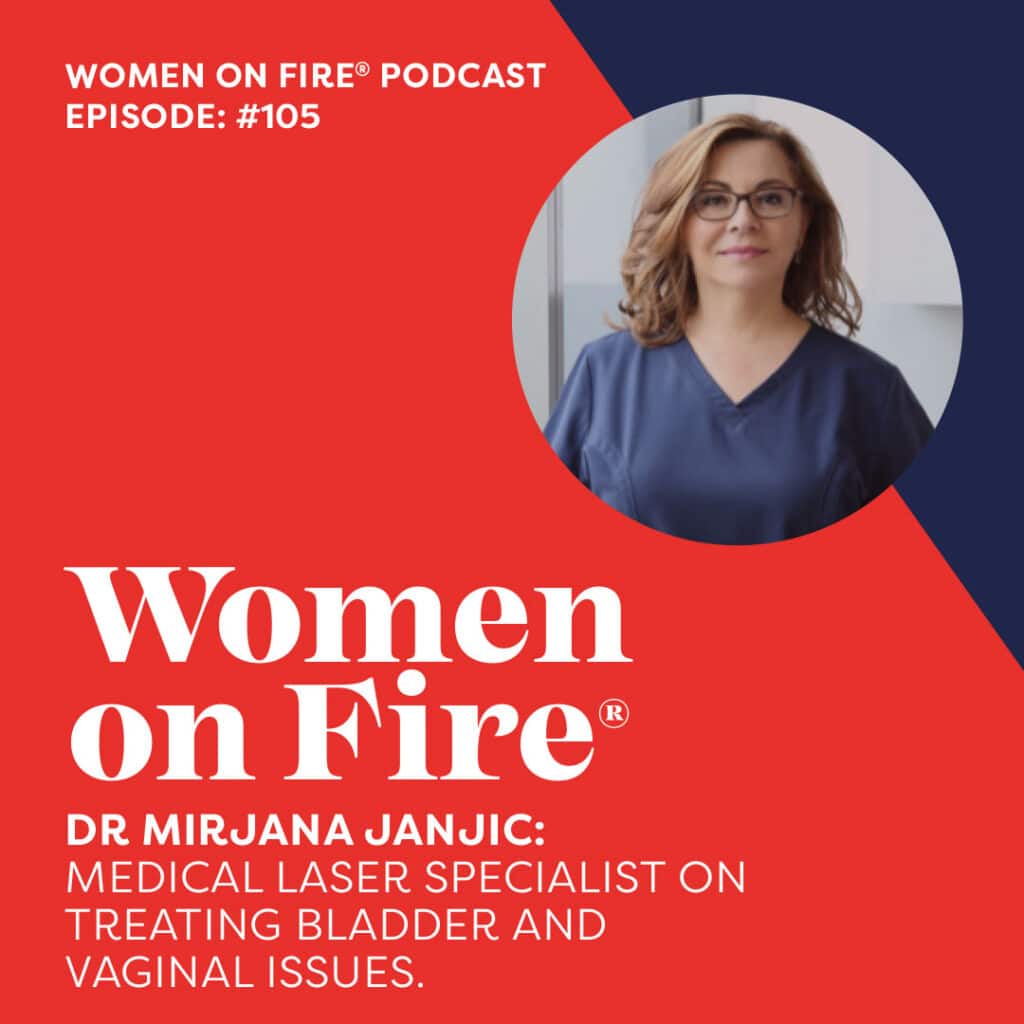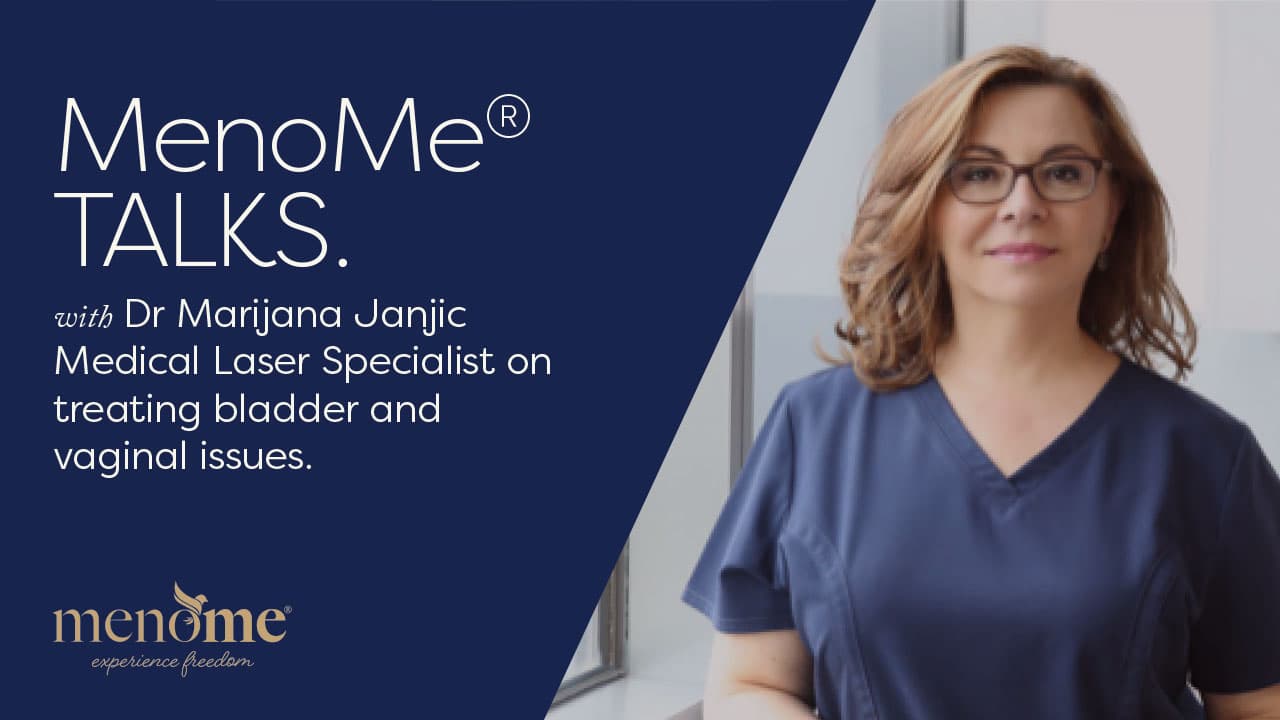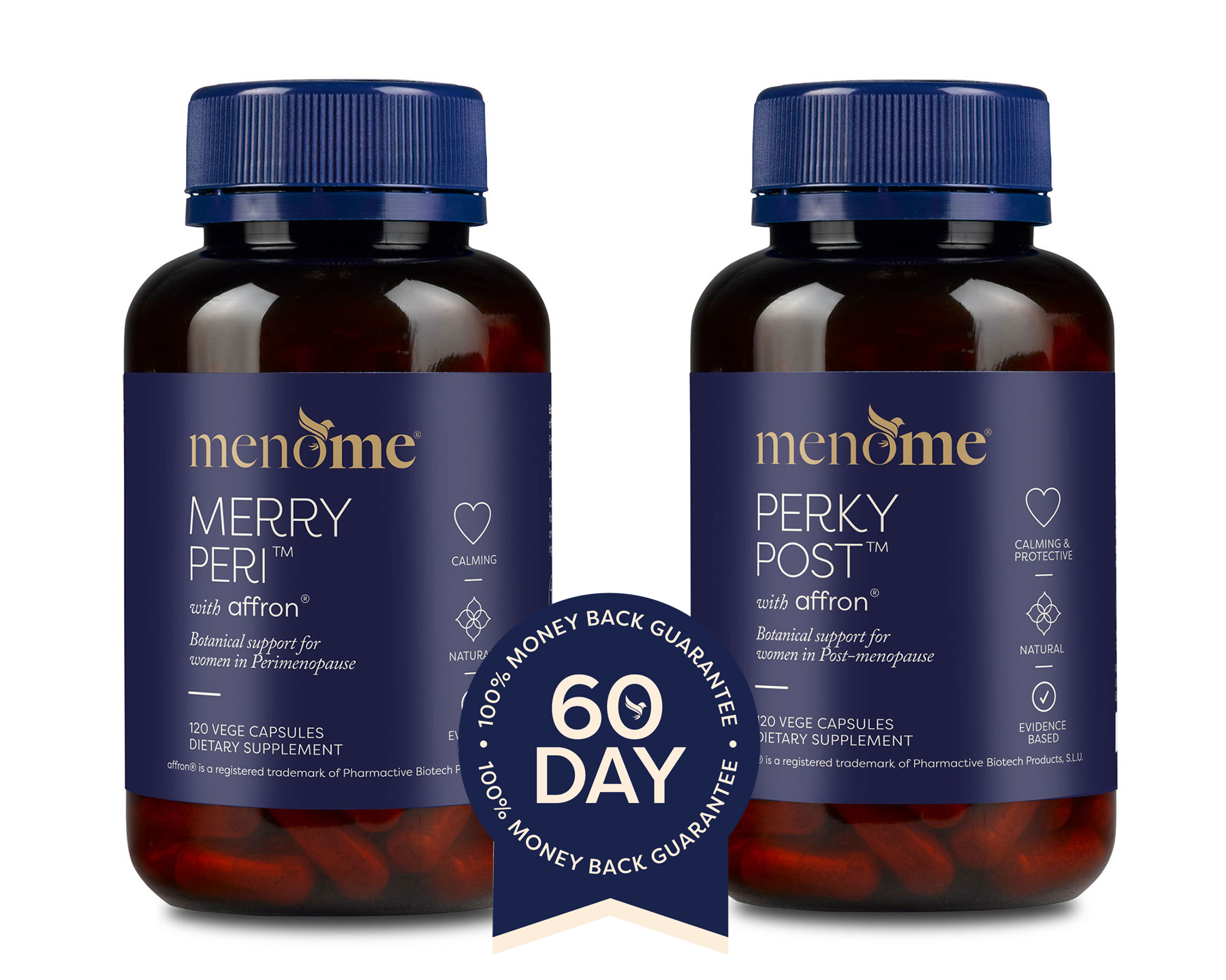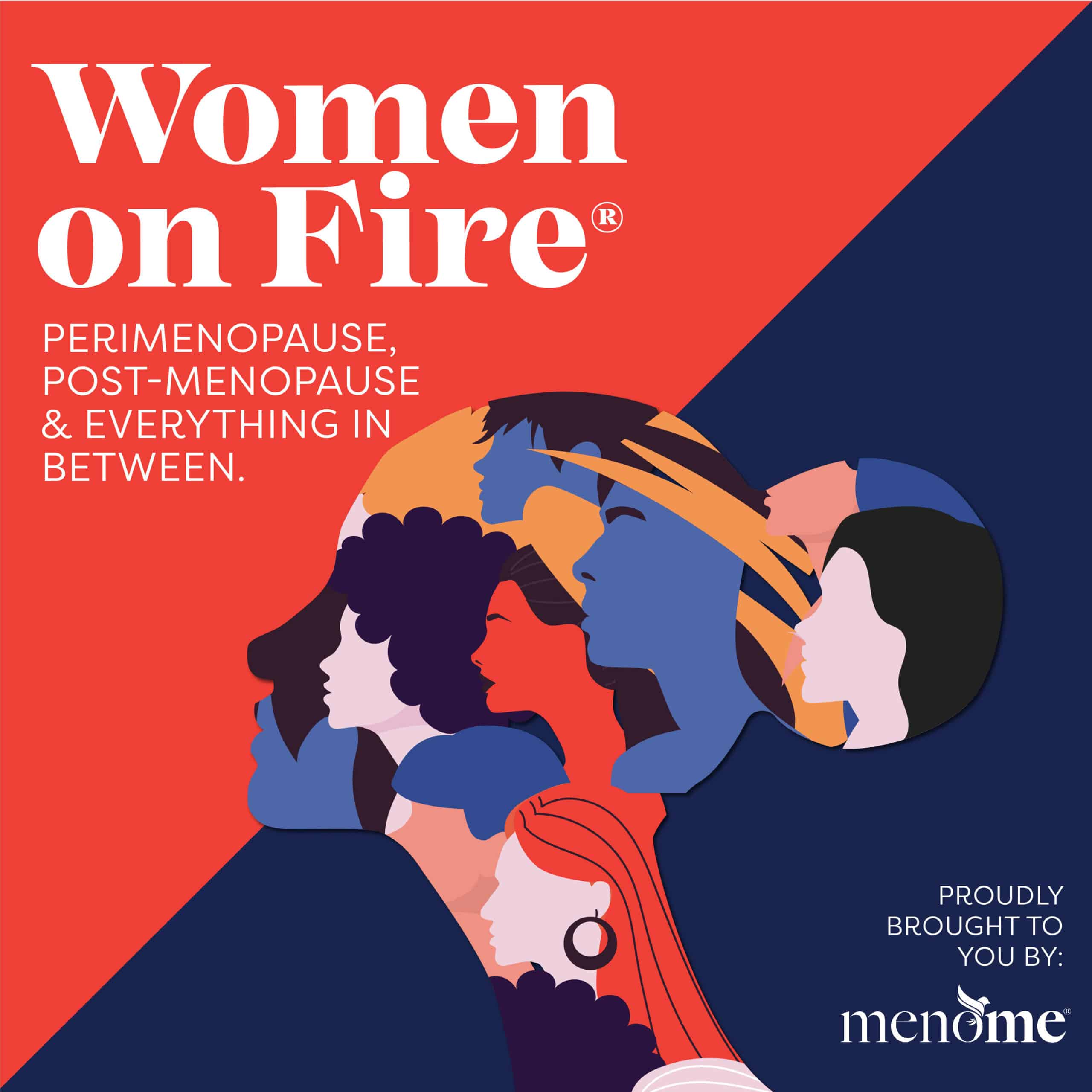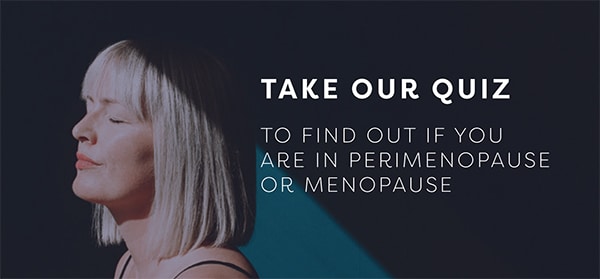Podcast Interview
In this episode, we talk about:
- Introducing Dr Mirjana Janjic (1:03)
- Urinary incontinence (2:00)
- Stress urinary incontinence (2:40)
- Fear, embarrassment and anxiety (3:38)
- There are ways to treat it (4:30)
- Urge urinary incontinence (5:05)
- Overactive bladder (5:49)
- Why declining estrogen in menopause affects the bladder and the vagina (6:18)
- What is vaginal atrophy? (8:11)
- What is vaginal prolapse? (10:30)
- What is the difference between vaginal atrophy and prolapse? (11:19)
- How do I know if I have vaginal prolapse? (12:41)
- Many women aren’t aware they have dysfunction. (14:00)
- What does vaginal medical laser treatment help? (15:00)
- How does vaginal medical laser treatment work? (16:38)
- Does it hurt? (17:35)
- What happens during treatment? (18:00)
- What is collagen remodeling? (18:57)
- Smoking and the vagina (20:00)
- What can I expect to feel during treatment? (23:18)
- Lifestyle and prevention (29:57)
- Midlife snoring treatment (33:33)
- Advice to women in perimenopause, menopause and post-menopause (33:43)
Video Version
Podcast Transcript
Jenna:
Today our guest is the lovely Dr Mirjana Janjic. She’s a GP, cosmetic physician and she also specialises in medical laser treatment and vaginal issues such as vaginal atrophy, vaginal prolapse and stress incontinence. Welcome, Dr Mirjana.
Dr Mirjana:
Thank you.
Jenna:
It’s great to have you and your expertise. Because I know you specialise in women’s health and you introduced to Australia amazing medical laser procedures, which you’ve also now introduced to New Zealand. So, I’m really excited to talk to you about this because I know it’s going to help so many women.
Dr Mirjana:
Yes, yes. I am very positive about that and hopeful that we can share the information about this innovative and very effective treatment for such common and annoying conditions.
Jenna:
Such as?
Dr Mirjana:
Such as, do you want to start with the most embarrassing one that no one wants to talk about?
Jenna:
Yes.
Dr Mirjana:
Stress urinary incontinence.
Jenna:
And it’s very common, isn’t it? And there are two types, right? Urge incontinence and stress incontinence. Can you explain the differences between those?
Dr Mirjana:
Stress urinary incontinence is a result of some form of pelvic floor damage and dysfunction. So, most commonly the cause for this is through childbirth, increased risk with multiple births, and increased risk with any form of trauma. And adding to that is the changes that women go through, well, through our whole life. We go from having a pregnancy, delivering babies, hormonal changes, and then ending up very commonly having to do heavy lifting with these children and gaining some weight through menopause. And menopause brings additional issues with the lack of estrogen. And for me, I approach this issue from my background of years of general practise where the woman will come and share how embarrassing it is to have to worry where the toilets are, leaking urine with simple activities like laughing, coughing, sneezing. In addition, being unable to actually participate in sporting activities due to fear of embarrassment if they leak urine. Avoiding those activities which doesn’t help because that contributes to anxiety, weight gain and not being able to play with the children. Time and time again women talk about these things.
And for some women that becomes almost a way of life. They think ‘my bladder is weak’. They don’t think for one second, ‘wait, there is something wrong with my bladder and I should go and see a doctor and I should find out what can be done’ because there certainly are things that can be done.
So that’s why I’m expanding a little bit here as this is probably having a more psychological impact in a woman’s life. Notwithstanding that urge incontinence happens for a different reason.
This can happen due to muscle damage or damage in the nervous system. So, these women often have issues where they have to get to the bathroom. And we use that analogy of rushing through the door with the bags in your hands, key in your hands, opening the door, and then not making it in time to get to a bathroom. A large number of these can be addressed differently because often behind them is another condition called overactive bladder. And overactive bladder is a condition we treat by retraining the bladder. And we also use medication. But it is not uncommon to have a combination of a little bit of both. But specifically where laser treatments can help is with stress urinary incontinence.
Jenna:
Can you tell us why declining estrogen affects the bladder?
Dr Mirjana:
Depending on the difference in our life events as a woman, whether we have had babies, whether we have had multiple babies. And most of the time we will see some problems with pelvic floor dysfunction by the time we reach menopause.
This means we have some weakening in that pelvic bonding structure area and we do not do the pelvic floor exercises we addressed earlier.
But when it comes to our vaginal tissues, throughout our life they’re supplied with an abundance of nutrients through good microcirculation and glands that support those tissues in the mucosa with a lot of lubrication and hydration. This starts declining with age and as we lose the estrogen and other hormones that we normally produce. For some women, this can be quite dramatic if they had – say – both ovaries removed. So hormonal factors there are big.
And we literally see a thinning as the cells become drier and thinner. This is what happens during menopause. So, we don’t have healthy tissues there anymore. And that brings us to the subject of what we often refer to as vaginal atrophy or the genitourinary syndrome of menopause because now we have twofold problems.
We have vaginal tissue that isn’t healthy anymore. So, the woman will start experiencing problems such as feeling dry, which can present as a burning sensation and can be uncomfortable during the day. They can also experience recurrent urine infections. And when it comes to sexual activity, it becomes almost impossible because it’s uncomfortable and there can be some bleeding associated with that.
So, we have to take care of these tissues. And sometimes women might have had chemotherapy or they have immune conditions such as diabetes. Further, they can have problems with Sjögren’s syndrome where we have the immune system turning onto our own cells that produce tears, mucous and saliva.
So you have limitations on how many of these conditions you can treat with estrogen creams etc. And if you can, women will usually report improvement and can safely continue after the initial two weeks of treatment using estrogen cream or pessaries twice a week. But being careful by using lubricants before sexual activity and avoiding things such as soaps in their body hygiene.
In fact, I have to say, I wanted to say to women, it’s important we look at what we use on our body and that it’s not something that will dry and dehydrate our skin further. We do that for our faces but we forget about our vaginas.
So, if you have someone who has thinning vaginal tissue and a weak pelvic floor, the ultimate risk is vaginal prolapse [where the pelvic floor drops] because that can be more noticeable. Furthermore, we can’t control what sort of intra-abdominal pressure we will have over time and often weight gain presents the highest risk. But if you have a little bit of that stress urinary incontinence and there is an increase of pressure, it becomes really, really complicated to treat.
It requires a multidisciplinary approach.
Jenna:
What’s the difference between vaginal atrophy and prolapse?
Dr Mirjana:
Vaginal atrophy describes the state of the tissue. So, our vaginal mucosal tissue inside the vagina and the condition of the tissues surrounding the vagina and pelvic fascia.
Then, vaginal prolapse may occur because as we experience changes here, we also lose collagen and elastin because of hormonal changes and ageing as well as damage to the pelvic floor. So, over time this creates an environment where our organs, such as the bladder, womb, uterus, or even our bowels can move from their original place and prolapse through that vaginal wall. And that is very common and most likely the reason why any woman who has had multiple births and children may end up requiring surgery in her lifetime.
Jenna:
I haven’t had vaginal prolapse myself, but I’ve heard it can feel like a dragging down or…
Dr Mirjana:
Yes, there are a number of symptoms. And again, if you’re not aware, you might not recognise them. Indeed, one is constipation. And a weakness of the bowel or a more advanced bladder condition. Difficulties passing urine because the bladder might compress which is the opposite of leaking the urine. And then you can feel some sort of vaginal discomfort and a heavy feeling. My patients commonly report that after – let’s say – they move house and they’ve done quite a bit of heavy lifting, they might be in the shower and suddenly feel as if something just slipped. They can sometimes feel it like that or have a dragging, heavy feeling that gives them lower abdominal pain or lower back pain.
All of these can be symptoms and signs that your pelvic organs are moving in a lower direction. In saying that, a large number of women through ageing will naturally have grade one to two pelvic floor prolapse and not be aware of it. Those might be women who have very strong pelvic floor muscles so they don’t actually feel it because they have bonding structure support. So maybe they’re not getting constipated as much. They’re not carrying extra weight. So, it can be asymptomatic for a lot of women.
And pelvic organ prolapse doesn’t necessarily go hand in hand with vaginal atrophic symptoms. It’s a sort of continuum and you might get more of one than the other depending on your individual case.
Jenna:
Wow, that’s so interesting. It’s kind of all interlinked.
So your laser treatment can help with all of these things?
Dr Mirjana:
To a degree, yes. We have indications for all of this. Whether we are going to address the issue of stress urinary incontinence, the genitourinary syndrome of menopause or early signs of prolapse and vaginal relaxation syndrome. In instances where you’ve had multiple deliveries, the vagina has to expand and dilate to allow the passage of the baby and the birth. And sometimes things might not go back to the way they were before pregnancy and childbirth. So, some women will also feel a sense of laxity in their vagina and it might affect their sexual relationship with a partner because they will feel less friction. It’s all to do with changes in the tissue of the vaginal wall and loss of collagen and elastin.
These are indications for the treatment because the laser that I use in my practice uses light in a form of photothermal energy. It is an erbium YAG laser that has a strong affection for water and water is on superficial skin cells.
So, what we have in comparison to some other laser and radiofrequency treatments is a very precise delivery of energy on a surface in what we refer to as non-ablative mode. Therefore, we’re not compromising the surface of the vaginal mucosa. We’re not ablating, we’re not cutting, we’re not burning. We are literally delivering the energy in a form of photothermal heat.
And I know a lot of my patients when they first come are interested in whether it hurts.
While you will feel some sensation during treatment, it doesn’t hurt because your vaginal environment is moist. It’s not like our skin, which is dry, so we can feel the same energy a lot more than in the vagina. And as we deliver this energy, what happens to our cells is two things. We already have collagen and elastin in our tissues, in our skin, in our bones and in our muscles. And sometimes in the vaginal mucous, collagen and elastin have been disturbed through all the changes we were talking about. Some of this is due to surgery such as hysterectomy and other procedures women can undergo.
So when we deliver energy in the form of heat in a safe, controlled manner, your tissues recognise that as an indication that something has occurred and they need to start the healing process. We call that process collagen remodeling. So the existing collagen and elastin literally gets shorter and stronger. And also, we stimulate fibroblasts to deliver new collagen.
That’s a really important factor as are the patients. Because someone at the age of 40 has way more ability to produce collagen than somebody at the age of 70. That’s a simple fact and why we see the ageing process. Because over time we lose the capacity to produce collagen and elastin so lovely, supple skin develops more crevices and wrinkles.
And further to that, both on the face and on the body like the vaginal area, a big issue is smoking. Smoking causes oxygen not to be delivered to the cells as well. So those cells are already changing with loss of hormones and now you’re attacking them with all of the negative impacts of smoking. You’re contributing to faster ageing because it damages existing collagen and elastin. And we need that existing collagen and elastin there because that’s what our laser is going to work with.
In addition, by strengthening the tissue in the vaginal canal and the surrounding endopelvic fascia between your bladder, urethra and pelvic floor, we are really increasing support. And rejuvenating the tissues inside the vaginal canal. And so, we see improvement in all of the aforementioned conditions. The woman who has stress urinary continence gains the ability to hold on and not leak that urine.
Some of my patients tell me part of the problem when they attempt to do pelvic floor exercises is that they couldn’t feel their muscles. When we strengthen the tissues they can feel the muscles more so there is more chance they will hold on with these muscles and not leak urine during coughing and sneezing.
And in addition to that, because we are actually treating the area around that urethral opening where the urine comes out we’re strengthening the tissue around it so we’re helping that point of weakness.
When it comes to vaginal atrophy, we’re naturally increasing the trophism of the cells, so women report they’re more lubricated naturally and they have less symptoms of dryness. Plus they have more comfortable sexual intercourse and less urinary tract infections and urinary urgency. And going on further, because again we’re working on vaginal canal, we have the reports of more firmness, so the woman whose main symptom may have been vaginal laxity will say, ‘I feel firmer, I can feel more’. And that is all a result of photothermal energy treating connective and mucosal tissue.
Jenna:
So, it makes it tighter, juicier and stronger. And does it hurt? No, you said no, it doesn’t.
Dr Mirjana:
I say no. It’s interesting, last week I had a patient who had her first treatment and she had absolutely no sensations. I always say to my patients, the first treatment is the worst one because you don’t know what to expect. I add “if you feel anything, please lift your hand and I will stop and we will check.”
Now she’s a younger woman so I didn’t expect her to have many sensations because like I mentioned, the more hydrated the vaginal tissues are, the less likely you’ll feel the heat. The next day when I called her, she also reported not having any side effects apart from feeling a slight tingle as she was going to the toilet. But that probably lasted 24 hours and then passed.
Now I have to say, if you are someone who does suffer with moderately severe vaginal atrophy, we have an adapted protocol. We don’t treat all conditions with the same protocol. Indeed, we have a gentle approach and we might treat you for a shorter period of time, give you a little break, then treat again. And when you come for your second treatment, we expect you to have noticed some improvement so the process has started. Not that we’ll expect all sensations to go away, but a second and third treatment are usually a lot more comfortable (if they weren’t at the start). So, I would still say no, I don’t think it’s painful. As someone who has had this treatment, I would say no.
Jenna:
So, from what you’re saying, you need a series of treatments and the time between treatments would be variable?
Dr Mirjana:
Yes, absolutely. Two main factors here are the younger person will develop collagen faster. They simply have more collagen and the ability to generate new collagen more quickly. So, our protocol usually states four weeks between treatments. It’s my personal practise to ask my patients who are probably mid-50s to mid-60s to come after six weeks. For no other reason than to give their body a little bit of extra time to develop collagen. Each patient requires three treatments and it’s standard protocol when we’re using laser. It’s evidence-based. It’s trying to capture every single fibroblast and make sure that we’ve treated the whole area adequately. Bearing in mind that by the third treatment, we’ve probably reached our plateau to how many cells we treated.
So that’s why we wouldn’t continue with a fourth or fifth or sixth treatment unless we were treating patients with prolapse in a clinical setting of research. We may then try and see whether the additional treatments may help. And the other thing, and I think it’s really important with all the treatments that are performed with the laser, women should be aware that it needs to be performed by a doctor. If you’re going into a clinic and you are assessed by a laser technician or a nurse without any presence or examination by a doctor, or delivery of this treatment by a doctor, you shouldn’t do it.
These are medical transvaginal treatments. These are not vaginal rejuvenation treatments. Their role is treatment of medical conditions. So, you have to be seen by a doctor and assessed by a doctor. There have to be a certain number of tests that we will sometimes perform to rule out things particularly when we have cases of mixed urinary incontinence. We need to know that we’re treating the right condition. Number one, to make sure we do our best for our patients. And number two, patients have to pay for these treatments. So, you would not want to treat someone and not have them see the results of your treatment.
Jenna:
There’s nothing else really you can do to increase collagen. You can do your eating healthy and things, but certainly, things like taking a collagen supplement or anything is not going to cut the mustard, is it?
Dr Mirjana:
The evidence is not there. And I believe in part that some of these supplements, no matter which way we ingest them, will be partially degraded by the acid in our stomach. I certainly don’t know of any positive link of taking collagen orally by mouth and having improvements in the vaginal area that we’re discussing. I think you’re correct.
I also believe that the most important thing for a woman who may have a family history of connective tissue disorders like diabetes or a strong history where first-degree relatives like a sister or mother have had bad prolapses is that a decision needs to be made before they start their family. Would it be beneficial to be assessed by a gynaecologist and to have cesarean section, not vaginal deliveries.
That is one way we can prevent this. The second thing is certainly lifestyle. You do need to know that if you’re doing heavy lifting in the gym, even if a woman hasn’t had a baby, that can still weaken the pelvic floor in some cases. So if a woman, after a year or two of these intensive exercises, notices some urine leaking, she needs to pause, stop, reduce those heavy weight lifting exercises, swap them with something else, like maybe Pilates or something, and be assessed. Because if we have a woman like that having a baby through vaginal delivery and not being aware of what can happen and how to prevent it, it’s a risk. It’s questionable whether we would want everyone to have cesarean section. Certainly not, but I do know women who have had cesarean section have less risk of pelvic floor prolapse and stress urinary incontinence.
One of the ways that I like to counsel women in my practise is if you had a baby and it was a big baby, prolonged delivery, and you feel things didn’t return back as quickly as expected – have a laser treatment. It’s a very low-risk procedure.
It’s very safe. And I’m talking about Fotona laser because it’s the only one that has clinical evidence with success rates up to 90%. So if we can see this woman before she goes and has the second baby and a third baby, and we help her in some way strengthen those connective tissues and supportive tissues in her pelvic floor.
I also want to emphasise that physiotherapy has to become – no matter what – every woman should exercise their pelvic floor. We have to, this is a good habit, good for our health, will not harm us in any way, and it can help us in a way we can’t even imagine can be problem later in life. So prevention for younger women is key.
The second step is if you finished your family and you’re in your mid-40s and you have first signs of these symptoms, please, please, please, come and see us in perimenopause. Have the assessment, go and see a GP, make sure that everything else is fine and that this is just pelvic floor damage or something we can treat with a laser. And undergo it before post-menopause, while you still have, lots of collagen in there we can work with because you will then minimise problems during menopause and later.
Jenna:
So as so often happens, prevention is better than cure, isn’t it?
Dr Mirjana:
Yes.
Jenna:
So, we’ve come to the end of our time together. I did want to ask you just quickly, you can treat midlife snoring as well, can’t you, for women? Because midlife women can begin to snore, can’t they? Which can be quite distressing.
Dr Mariana:
Yes. Absolutely. One of the indications for treatment with a Fotona laser called Night Lase addresses the issue where we have a, what we like to say, low-lying soft tissue. Think about your soft palate.
Because using the same principles we can actually tighten and lift those tissues and open up the airways. So, one of the first things I do with my patients, is an assessment according to something called Malampati score to see how much of that soft palate I can see when they open their mouth for a simple examination with a spatula. Like you do when you go to see a doctor for sore throat or some other conditions. And if I can see that there is a really long tissue there, not very visualised, the passage of the air can definitely be diminished. We have more visual evidence that this treatment can work. Saying that we do need to make sure that the patients are not snoring because they have some nasal problems such as nasal polyps. And unfortunately, being overweight, BMI over 32 or obese, becomes a contraindication for the treatment just based on the fact that we might not guarantee success if there is a lot of expanded tissues with fat cells in there. They might not respond to laser treatment as well as when we just treat the soft palate tissue by itself.
Jenna:
Okay, that’s fascinating. So as a woman yourself, and a woman who works with women, is there an overarching piece of advice, considering what you specialise in, that you would give to a woman who’s experiencing any stage of perimenopause, menopause, post-menopause?
Dr Mariana:
Yes, and that would be, please don’t be embarrassed. So many of us have this problem. So many of us will simply spend the rest of our life having to have a pad in our panties, having to look where the bathroom is, having to be slightly anxious if we’re coughing or sneezing. But there is nothing wrong with that. The only thing that is wrong is that we don’t find out what exactly we’re experiencing. Please don’t neglect this. It’s a part of your health assessment.
For any woman coming to me after the age of 40, or even earlier if they’ve had a baby, these are normal questions to ask as a GP, and we will address them for you.
I find conditions like these are having such a negative impact on women’s mental health, anxiety and even sleeping. If you have to get up three, four times at night to go to the bathroom, that is not normal. That can be addressed. And in cases of overactive bladder, which we don’t treat with a laser, a simple bladder retraining, and medication can help. And for a large number of the women, I know when we talk about laser, they will say, ‘no, thank you, not for me, something from Star Wars, not interested’.
Or quite frankly, there are situations where it’s cost prohibitive because it’s not funded. But just the pelvic floor exercises with a trained pelvic floor physio will see 65% to 75% of women experience improvement in their symptoms.
And lastly, think about coffee. Think about tea. If you’re already having these things, then a decaf coffee or tea or even better herbal tea and a simple, beautiful New Zealand fresh water is a little sacrifice. I’m not saying don’t have a glass of wine here and there! But coffee and tea do contribute to urinary urgency and hot chocolate, sadly, which I like. So, yes, I’m thinking let’s stand up and say, ‘hey, look, I matter. I should be feeling good. If I was living in Okinawa and living till I’m 90 or 100, I’m not going to be letting this get in the way of me enjoying life and playing with my children and grandchildren’.
Jenna:
Cheers to that. That’s such good advice. Thank you. So, thank you so much for being with us today. Now, do you still work in Australia as well as New Zealand? Or how can people get in touch with you?
Dr Mirjana:
I have permanently moved my family and my husband here to Auckland. I’m currently working and offering these treatments and laser is based in Auckland, in Remuera. I work in collaboration with a female plastic surgeon, Dr. Kasia Mackenzie. To contact me, you can find my website. It’s very simple, drmj.co.nz, which will have the details and my number. I still teach doctors in Australia about vaginal, transvaginal lasers and use of lasers because the more doctors who are able to offer these treatments safely, the better for our patients in Australia and New Zealand.
Jenna:
Thank you so much. Thank you.
Thank you for listening. We hope you enjoyed this episode. If you did, please share it and rate it because it helps other women join the conversation.
